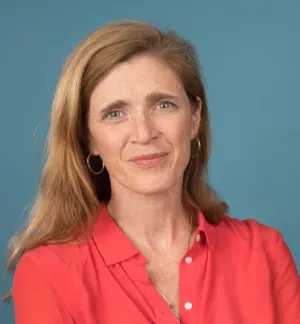
Thank you, Mr. President. Thank you, Deputy Secretary-General Eliasson, Secretary-General Afifi, and Deputy General Counsel Crown, for taking the time to brief us today on this very important topic.
I also want to single out Egypt for thanks, and Foreign Minister Shoukry specifically, for calling this session. And I’d like to offer my sympathies on behalf of the American people to you and the people of Egypt for the despicable attack that occurred in Cairo on Sunday which killed eight police officers. That ambush underscores the continuing deadly, inhuman threat posed by ISIL – or Da’esh – and of course by groups who adopt similar tactics.
On a visit to Cameroon, Chad, and Nigeria last month, I met with some of the countless victims of Boko Haram, which has recently pledged allegiance to Da’esh. One woman I spoke with had seen her husband executed and had her three children ripped from her grip, taken by Boko Haram. Now alone, displaced, she doesn’t know why she’s still alive and she says her life no longer has meaning. She just sits around all day, every day, and pines for her children and wonders is there more that she can do to somehow bring them back. I met a 14-year-old girl who described having been given a “choice” by the terrorists who had burned down her home: be killed, or become a Boko Haram “bride.” She chose life; and after a year of sexual enslavement by Boko Haram, she managed somehow to escape her monstrous captor. But now, in a refugee camp, she blames herself for the stigma that she carries with her from the time that she spent with Boko Haram. She feels shame, while those who enslaved her appear incapable of shame.
An eight-year-old boy told me that he was studying at his madrassa when Boko Haram began shooting; he fled alone into the bush, and has not seen his parents since. He doesn’t know if they are alive. Such horrors inject acute urgency into this session as the Council seeks to strengthen its collective effort to defeat ISIL, al-Qaida, and terrorist groups like them. There could be no more urgent cause on Earth.
None of us are immune to the threat posed by these groups. In Minneapolis on Monday, three young American men went on trial, charged with conspiring to provide material support to ISIL and to commit murder abroad. One of their mothers lamented what had happened to her boy, saying “I told him to never even mention those names, ‘Al-Shabab’ or ‘ISIL,’ because the Qur’an says nothing about the reasons to kill anyone in the ways ISIL talks about.” Six other Americans pleaded guilty to similar charges earlier this year; some of them told a judge that they had been inspired by ISIL recruitment videos and social media.
As we consider the task of countering violent ideologies, we all must recognize that the common goal of countering terrorist ideology should never be used as an excuse to suppress political dissent. Many countries recognize narrow, clearly delineated exceptions to the right of freedom of expression – such as incitement to imminent violence in the United States. But there is a clear and vast difference between responding to those legally prescribed exceptions and broad-based attempts to silence government critics. Legal action is a critical tool in the campaign against ISIL, but it must not be wielded like a cudgel against those who voice unpopular speech or criticize authorities. Such behavior doesn’t prevent violent extremism – it fuels it.
I would offer three principles upon which to ground our common strategy to counter the poisonous ideologies and narratives propagated by groups like ISIL.
First, such a strategy should focus on exposing the lies, distortions, and falsehoods which underpin terrorist narratives. The most influential and effective actors in this effort will always be religious leaders, civil society organizations, community groups, and individual citizens. Independent voices can spread the truth about what life is really like under ISIL’s control; religious leaders can reject ISIL’s perverse distortions of faith by spreading Islam’s message of peace, love, and tolerance. ISIL clearly fears this threat; just this past weekend, the group called for the murder of 11 imams and scholars living in the United States and elsewhere, who have actively worked to rebut its narratives and discredit its ideology. Governments can play a supporting role by convening and amplifying independent voices – as the United States has done in partnership with the United Arab Emirates in the establishment of the Sawab Center, which has provided training to civil society organizations and other groups.
Second, an effective strategy will facilitate the free flow of information. Such openness expands public access to the truth, and in this battle, the truth is clearly on our side. We have nothing to be afraid of. The internet itself is not a threat – though it can host ISIL lies and propaganda, it also makes possible the flow of counter-narratives, the exchange of new ideas, and the voices of tolerance who vastly outnumber the exceptions. A free press might criticize its government – certainly those in my country do this – but this is precisely what makes those voices credible, and ensures that they are seen as independent by the public. A reputation for impartiality and reliability is what makes their reporting on the atrocities and perversions of ISIL and others so powerfully important.
By contrast, arresting journalists; sentencing reporters to death; treating media as an enemy of the state – such actions are thoroughly counterproductive. The media is an ally when it comes to showing the truth about terrorist groups. Attacking the media will not produce a more compliant citizenry; it will produce a more alienated, suspicious, and disenfranchised public, one more likely to chafe under a government’s attempts at control – all to the benefit of terrorist groups. It is telling that one authority which recently sought to curtail the flow of information to the people under its control is ISIL itself. Last year it banned private internet access in Raqqa, in an attempt to prevent disaffected fighters from reaching their families, and to stop locals from telling the outside world about life under ISIL rule. It also banned satellite dishes and receivers, railing against what it called the “news channels [that] spread falsified lies and defamation.” ISIL is right that the internet and a free media threaten them. It is critically important that no UN Member State follow its lead and adopt the same view.
This brings me to a third principle that should underline our approach: we have to better understand the factors that make some people, or communities, particularly drawn to terrorist narratives so that we can better spot them and counter them. The motivation of those who become radicalized is so varied. To give one example, after extensive online conversations, one lonely 23-year-old Sunday school teacher and babysitter in Washington state was prepared to marry a stranger and move to Syria; she was stopped only after her grandparents intervened.
Recalling the gifts and attention her new online contacts lavished upon her, she told a reporter later, “I felt like I was betraying God and Christianity – but I also felt excited because I had made a lot of new friends.”
An imam in central Mali recently told a researcher from Human Rights Watch that in extremist groups local appeal had nothing to do with religion, but simply that, in a region where the government is unable to provide security or basic social services, “the jihadists provide a better alternative to the state.”
Identifying these dynamics enables us to seek to address them, and the strategy we develop today to combat terrorist narratives must be grounded in broader efforts to counter and prevent violent extremism. Endorsing the Secretary-General’s Plan of Action to Prevent Violent Extremism when it is raised next month will represent an important step in this direction.
Let me conclude. I mentioned earlier that ISIL recently called for the murder of eleven imams and scholars in response to their efforts to counter ISIL messaging. What are they doing that makes them so dangerous to ISIL? They’re not just rejecting the terrorists’ perverted views – they are actively promoting alternative ideas and advancing a more positive narrative. They are doing so not only through traditional means, but through social media tools – platforms like Twitter, YouTube, Instagram, and Facebook. They are discussing religion over Snapchat.
Counter-messaging, social media, and an open internet that enables young people to access such content: this is how we defeat the narratives and ideology of ISIL in the modern era. That’s the antidote – not restrictions on the media, filters on the internet, or attacks on political opponents. In both the development of our common framework, and approaches in terms of our individual governance, it is essential that we see political freedom as the enemy of terrorism that it is.
Thank you.
###
Power, Samantha. “Remarks by Ambassador Samantha Power at the UN Security Council Open Debate on Countering the Narratives and Ideologies of Terrorism: Threats to International Peace and Security Caused by Terrorist Acts.” March 11, 2016


